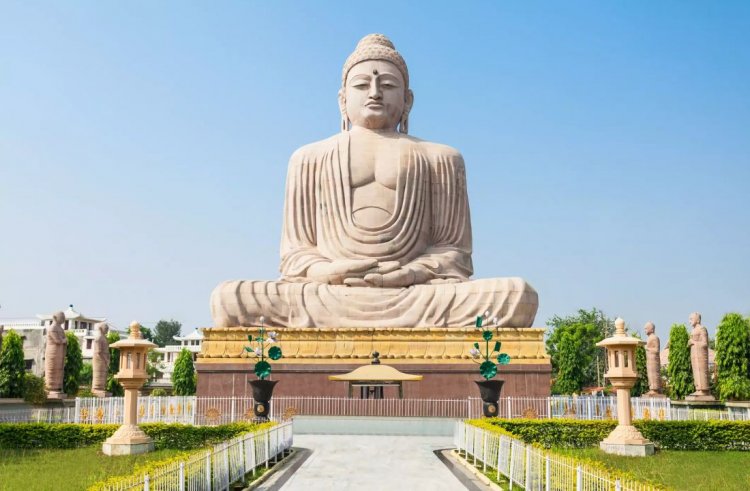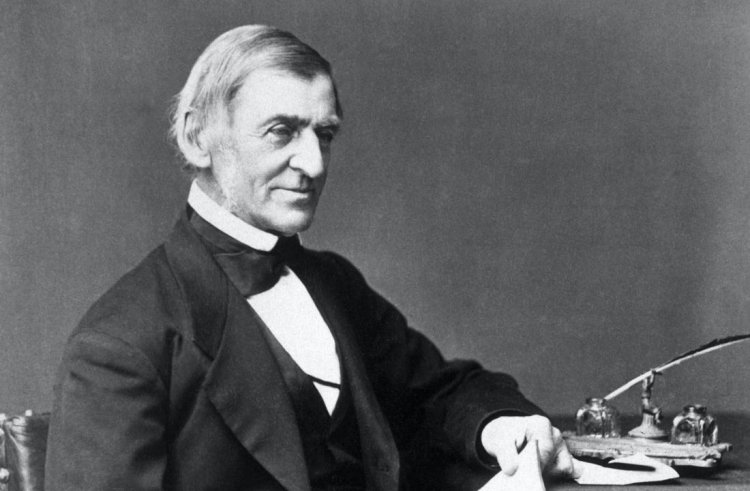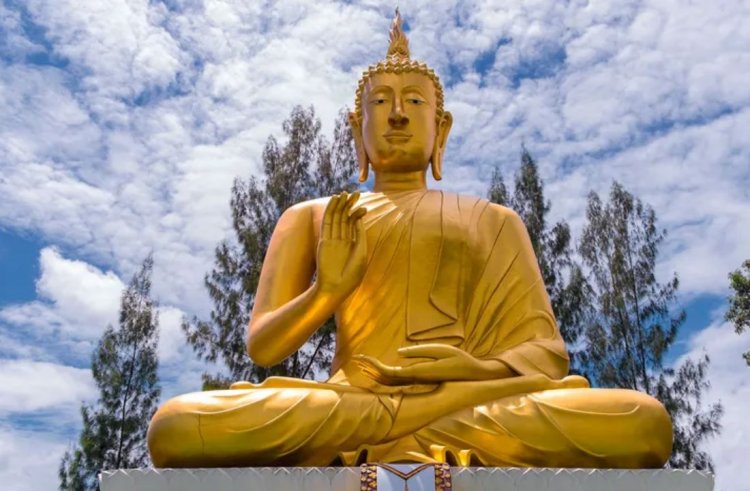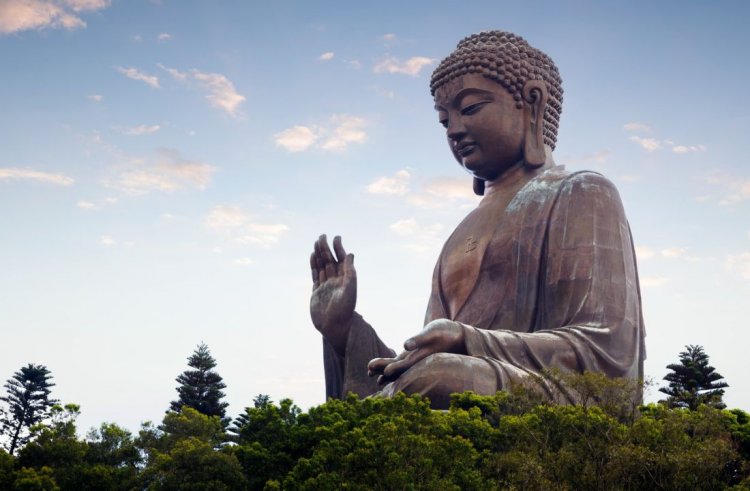The most important life lessons we should learn from Buddha
The most important life lessons we should learn from Buddha
Updated on August 14, 2022 14:37 PM by Ava Sara
Have you ever wondered why the Buddha is always shown in statues as serene, collected, and grinning? Gautam Buddha discovered life's truths by learning about its hard realities. He destroyed his ego and discovered the beauty of the moment.
You will need to absorb some of his life lessons to be calm and collected like him. Siddhartha Gautama, who came from the kingdom that is now known as Nepal, was a renowned spiritual figure. He established Buddhism.
He is referred to as the Supreme Buddha in the majority of Buddhist lineages. The term 'Buddha' is translated as 'the enlightened one or 'the awakened one.' The main person of Buddhism is Siddhartha, whose life, teachings, and rules for monastic life were recounted after his passing and remembered by his disciples.
Also Read: gemini-horoscope-today-august-13-2022-change-your-lifestyle-as-soon-as-possible
About Gautama Buddha

A South Asian ascetic and spiritual guide named Gautama Buddha (also known as Siddhartha Gautama, Siddhattha Gotama, Shakyamuni, Sakyamuni, and The Buddha lived in the later half of the first millennium BCE.
Buddhists revere him as the creator of Buddhism and a fully enlightened being who revealed the way to NNirvanaor and escaped from ignorance, craving, rebirth, and suffering. The Buddha was born to wealthy Shakya clan members in Lumbini, Nepal, according to Buddhist history, although he later left his family to live as a traveling ascetic.
He spent his life begging, practicing asceticism, and practicing meditation before becoming enlightened in Bodh Gaya. After that, the Buddha traveled the lower Gangetic plain, teaching and establishing monastic orders.
He advocated for an intermediate path between indulgent sensuality and strict asceticism, one that involved ethical instruction and contemplative techniques like effort, attention, and jhana. In Kushinagar, he passed away and attained nirvana.
Since then, many Asian communities and religions have honored the Buddha. The Buddha's teachings were collected by the Buddhist community in the Vinaya, his rules for monastic conduct, and the Suttas, literature based on his lectures, several centuries after his demise.
These were transmitted orally in the Middle Indo-Aryan languages. More works were written by later generations, including systematic treatises called Abhidharma, biographies of the Buddha, collections of tales about his past lives called Jataka tales, and additional discourses, such as the Mahayana sutras.
Also Read: patagonia-life-on-the-edge-of-the-world-a-living-fossil-from-the-past
Add Block
Birth and Early Life
According to the Buddhist legend, the Buddha was born in Lumbini in modern-day Nepal and was raised in Kapilavastu. The location of ancient Kapilavastu is uncertain. It could have been either Tilaurakot in modern-day Nepal or Piprahwa, Uttar Pradesh, in modern-day India.
Both locations are only 24 kilometers (15 miles) apart and were once part of the Sakya realm. His mother, Maya (Mydev), was a Koliyan princess, according to subsequent histories like the Mahavastu and the Lalitavistara, who was married to Suddhodana.
According to legend, Queen Maya dreamed that a white elephant with six white tusks entered her right side the night Siddhartha was conceived. Ten months later, Siddhartha was born.
His mother, Queen Maya, followed Shakya's custom and departed for her father's realm to give birth when she became pregnant. Her son, however, is rumored to have been born in Lumbini when they were traveling, in a garden beneath a sal tree.
Historical Person
Unqualified statements about the historical truths of the Buddha's life are avoided by academics. The majority of them agree that the Buddha was a younger contemporary of Mahavira, the Jain Tirthankara, and lived, taught, and established a monastic order during the Mahajanapada period and the reign of Bimbisara, the ruler of the Magadha empire.
Despite the widespread acceptance of the overall order of birth, maturity, renunciation, quest, enlightenment and liberation, teaching, and death, there is less agreement regarding the validity of many of the specifics included in conventional biographies.
Gautama's birth and passing are unknown dates. Early 20th-century historians generally assigned his lifetime a range of 563 to 483 BCE. The Buddha's death is often dated to 949 BCE in the Eastern Buddhist traditions of China, Vietnam, Korea, and Japan. Buddha is thought to have passed away in 833 BCE, according to the Kalachakra tradition's Ka-tan system of time computation.
More recently, his passing is estimated to have occurred between 411 and 400 BCE and during a symposium on the subject conducted in 1988. The majority of people who provided definite opinions cited dates for the Buddha's passing that was within 20 years of 400 BCE on each side. Although not universally accepted, these alternative chronologies have some supporters.
Add Block
Here are some life lessons from Buddha

It's Okay to start from a Small 'A jug fills little by little according to Ralph Waldo Emerson, 'Every artist was once a novice.' We all begin tiny, so don't hate on humble beginnings. You will be successful if you are persistent and patient! Success belongs to those who are willing to start small and patiently labor until their jug is filled; no one succeeds overnight. This is the first life lesson of the Buddha.
Also Read: shawn-mendes-spends-time-doing-this-simple-thing-in-life-to-regain-his-life
Add Block
Thoughts become Things
Our thoughts have shaped everything that we are. When a man speaks or behaves evilly, suffering is sure to follow. Happiness accompanies a man who speaks or acts with pure thought like a shadow that never goes away. 'The mind is everything,' the Buddha stated. You become what you think.
'Man is mind,' remarked James Allen. You must surround your mind with the 'correct' thoughts if you want to live right. Your thoughts influence how you behave and how you behave how things turn out. Everything you want will come true if you think well; thinking incorrectly is a vice that will eventually lead to your demise. The second life lesson of the Buddha.
Forgive
If you try to throw hot coal at someone else while still harboring resentment, you will get burned. You are the one who is set free from jail. When you pardon people, you are imprisoned in the prison of unforgiveness. You cannot keep someone down unless you also remain down. Learn to forgive, and forgive without delay. The third life lesson of the Buddha.
Add Block
It's your action that count

What good would it do you, no matter how many times you read or recite the holy words if you don't put them into practice? Talk is inexpensive, as they say, and it is. It would help if you took action to advance, and daily action is required to advance swiftly.
Success won't just happen to you! Everyone has the potential to be great, but only those who are willing to act consistently will achieve it. GGodgives every bird a worm, but he doesn't put it into their nest,' according to a proverb.
Being great requires acting great. I do not believe in a fate that befalls men regardless of their actions, but I do believe in a fate that befalls them if they do not act, according to Buddha. The fourth life lesson of the Buddha.
Add Block
Seek to Understand
In a dispute, the moment we become angry, we have already stopped seeking the truth and have started seeking our interests. Seek to understand before seeking to be understood, according to Stephen Covey.
Easy to say, very hard to execute; you have to work to comprehend the viewpoint of the 'other' person. When you start to get angry, let it go. You'll feel more at peace if you pay attention to people and comprehend their viewpoints. Think more about being joyful than being right. The Fifth life lesson of the Buddha.
Conquer Yourself
'Beating yourself is preferable to winning a thousand fights. The triumph is then yours. You cannot have it taken away by angels, demons, heaven, or hell. Greater than the powerful is he who can overcome himself.
You must master your thinking to master yourself. You must exercise mental restraint. You cannot allow your mind to sway back and forth like the ocean waves. I can't control my thoughts; if a notion comes, it comes, you may be saying. I respond by saying that while you might not be able to prevent a bird from flying over your head, you can prevent him from making a nest in your hair. This is the sixth life lesson of the Buddha.
Add Block
Live in Peace

'Peace originates internally. Don't look elsewhere for it.' Don't look outside yourself for something that is only inside yourself. Many times, we may just glance away to divert our attention from the reality that we already know to be true.
The fact is that inner serenity can only be attained. Peace is a new viewpoint, and that new perspective starts with you. Peace is not a new job, new car, or new spouse. The seventh life lesson of the Buddha.
Also Read: 11-mindful-lessons-buddha-will-change-way-live-life
Add Block
Add Block
Be Thankful
Let's get up and give thanks because even if we didn't learn much today, at least we learned something, and even if we didn't learn anything, at least we avoided being sick, and even if we did get sick, at least we avoided dying.
There is always something to be thankful for. Don't let your pessimism prevent you from appreciating all the things you have to be thankful for, even for a brief minute. Some folks went to bed last night for the final time, so not everyone woke up this morning. There is always something to be thankful for, acknowledge, and express gratitude for. Your greatness comes from a grateful heart!
Be true to what you know
'Not staying faithful to what one knows to be true is the only real failure in life.' We have a lot of knowledge, but we don't always act on it. If you don't succeed, it won't be because you didn't know what to do; it will be because you didn't follow through.
Work to implement your knowledge. Instead of just consuming knowledge, spend time thinking about ideas that will help you become the person you want to be until you are driven by a burning desire to do so. This is the ninth life lesson by the Buddha.
Also Read: 11-lessons-from-gautam-buddha-that-will-help-you-win-at-life
Travel Well
'Being well-traveled is preferable to being on time.' The journey is the point of life! I'm already there; I'm not attempting to get there. Where I am right now made me happy, content, and fulfilled. I may visit prettier locations and drink richer wines, but my travels are going well.
Don't postpone your happiness until some hazy future period because you believe achieving a certain objective will make you happy. Enjoy your journey today and travel safely. The last and the tenth life lesson of the Buddha.





